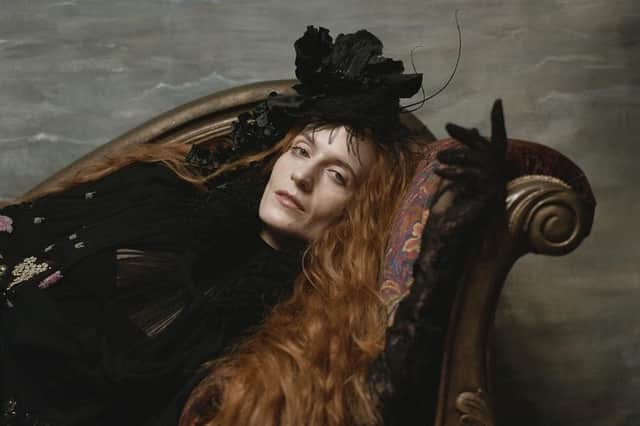Album reviews: Florence + The Machine | Van Morrison | Gentle Sinners


Florence + The Machine: Dance Fever (Polydor) ****
Van Morrison: What’s It Gonna Take? (Exile Productions/Virgin) ****
Gentle Sinners: These Actions Cannot Be Undone (Rock Action) ****
Advertisement
Hide AdAdvertisement
Hide AdIt is not difficult to picture such an extrovert natural performer as Florence Welch climbing the walls at home over the last two years, having started an album she couldn’t release or tour. Dance Fever, the fifth album by Florence + The Machine, is the musical equivalent of restless leg syndrome, a celebration of finally coming together to collectively lose it on the dancefloor.
However, this is no conventional dance record. Instead Welch works with producer Jack Antonoff and Glass Animals’ frontman Dave Bayley to produce an expansive alternative pop album inspired by the medieval phenomenon of choreomania or St Vitus’ Dance, where sufferers would dance themselves to injury or even death.
This notion of being consumed by movement plays into the image of Welch as a creature who cannot be contained. With its peppy handclaps and minimal keyboard pulse, the track Choreomania features Florence spinning around, not as a Kyliesque disco diva, but like Kate Bush in her Red Shoes.
There is a touch of Patti Smith in her unfettered delivery of Dream Girl Evil, one of a few elemental rock epics on the album. Elsewhere, she channels Cassandra, the prophetess who was never believed, in classic open-throated Florentine style, building for the sake of building before coming to an abrupt stop.


Such is Welch’s force of personality that she easily inhabits a diverse array of styles, from the gentle semi-a cappella meditation Back in Town via jazzy acoustic shuffle The Bomb to the twanging country gospel of Morning Elvis and harmony incantation Heaven Is Here, punctuated by guttural utterances and tribal whoops.
Daffodil, a harpy-like rocker built on thunderous drumming, begins with a theatrical intake of breath and ends with another abrupt cliff edge. Girls Against God rails against the idea of not being able to perform but she lets it all hang out on her token big dance tune My Love.
Who knew that Van Morrison was also partial to a party? “Can’t go out dancing, can’t find no joy, can’t go on holiday,” he laments on Can’t Go On This Way, one of many R&B odes to lockdown fatigue and downright Covid scepticism on his 43rd studio album.
Advertisement
Hide AdAdvertisement
Hide Ad“Somebody said I was dangerous, I said something bad but it must have been good” he self-justifies at some length on opening track Dangerous. And he’s off… lamenting “snowflakes hiding in their houses” over jaunty piano trills on Damage and Recovery, and sticking it to The Man on Fodder for the Masses (“just want to keep you following the rules like a fool”).


Song titles such as Fighting Back is the New Normal tell their own story, but have become a self-fulfilling prophecy by the time he reaches Sometimes It’s Just Blah Blah Blah. Fortunately, the light, natural, soulful flow of the music from his excellent musicians counteracts the grouchiness of the lyrics from this unrepentant malcontent, who finds space towards the end of What’s It Gonna Take? to embrace alternative topics such as artistic dissemblance.
Longtime friends and associates Aidan Moffat and James Graham, respectively the frontmen of Arab Strap and The Twilight Sad, come together as Gentle Sinners, setting Graham’s self-comforting and self-confronting lyrics against Moffat’s atmospheric noir soundtrack, which builds on his solo work as Lucky Pierre with the gothic gamelan backdrop to Waiting for Nothing, industrial percussion and guitars of Let Them Rot and delicate piano and cymbal hiss of Date & Sign. Moffat makes a vocal cameo with a world-weary recitation on the Suicide-like electro rock of Shores of Anhedonia, while the guitar arpeggios of Face to Fire (After Nyman) are closer to the pomp of Rush or Journey than the eponymous composer.
CLASSICAL
Rachmaninov: Piano Sonata No 1 / Moments Musicaux (Hyperion) *****
If anything defines Steven Osborne’s distinctive brand of pianism it’s the mesmerising totality of his awesome technique and penetrating musicianship. It is nothing short of all-consuming in this powerful, authoritative new recording, which opens with the monumentalism of the Piano Sonata No 1 before giving way to sundry miniatures and finally the Op 16 set of Moments musicaux. The sonata performance – a vast, Faustian symphonic discourse embodying the gurgling turbulence of the opening movement, the lyrical intensity of the Lento and the tumultuous struggle and victory of the finale – is mind-blowing perfection with an encyclopedic rage of sonorities, Lisztian in spirit. The Moments Musicaux are more Chopinesque in their intimate honesty, though Osborne observes with breathtaking detail their rich expressive possibilities. Among the remaining miscellany is the enchanting Nunc dimittis from the All-Night Vigil and vital brevity of Oriental Sketch. Ken Walton
FOLK
Kinnaris Quintet: This Too (kinnarisquintet.com) ****
Propitiously ringing mandolin opens this joyously spirited second album from the Kinnaris Quintet, their three tightly layered fiddles – played by Laura Wilkie, Fiona MacAskill and Aileen Reid – underpinned and interlaced by mandolinist Laura-Beth Salter and guitarist Jenn Butterworth. As well as the hard-driving sets for which they’re known, such as Burdland (which includes a pretty vague nod to the Weather Report classic), its darting strings driven by tautly slapping guitar, there are excursions into Americana, as in the perky Period Drama, Salter’s mandolin suggesting echoes of the Punch Brothers. These largely self-composed sets suggest a collective ear for a good tune and sympathetic arrangement, as in Reid’s fetching Haleybev & Chris Got Married, or the catchy pizzicato and rich harmonies of Happy Days. And amid all this very contemporary tunesmithing, the retreat march McGregor of Rora makes a stately entrance in the final set. Jim Gilchrist